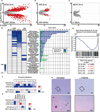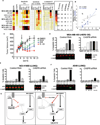Sequential application of anticancer drugs enhances cell death by rewiring apoptotic signaling networks
- PMID: 22579283
- PMCID: PMC3501264
- DOI: 10.1016/j.cell.2012.03.031
Sequential application of anticancer drugs enhances cell death by rewiring apoptotic signaling networks
Abstract
Crosstalk and complexity within signaling pathways and their perturbation by oncogenes limit component-by-component approaches to understanding human disease. Network analysis of how normal and oncogenic signaling can be rewired by drugs may provide opportunities to target tumors with high specificity and efficacy. Using targeted inhibition of oncogenic signaling pathways, combined with DNA-damaging chemotherapy, we report that time-staggered EGFR inhibition, but not simultaneous coadministration, dramatically sensitizes a subset of triple-negative breast cancer cells to genotoxic drugs. Systems-level analysis-using high-density time-dependent measurements of signaling networks, gene expression profiles, and cell phenotypic responses in combination with mathematical modeling-revealed an approach for altering the intrinsic state of the cell through dynamic rewiring of oncogenic signaling pathways. This process converts these cells to a less tumorigenic state that is more susceptible to DNA damage-induced cell death by reactivation of an extrinsic apoptotic pathway whose function is suppressed in the oncogene-addicted state.
Copyright © 2012 Elsevier Inc. All rights reserved.
Figures







Comment in
-
Network medicine strikes a blow against breast cancer.Cell. 2012 May 11;149(4):731-3. doi: 10.1016/j.cell.2012.04.014. Cell. 2012. PMID: 22579276
-
Cell death. 1+1≠2.Nat Rev Cancer. 2012 Jun 14;12(7):449. doi: 10.1038/nrc3301. Nat Rev Cancer. 2012. PMID: 22695396
-
Throwing the kitchen sink at melanoma drug development.Pigment Cell Melanoma Res. 2012 Sep;25(5):543-4. doi: 10.1111/j.1755-148X.2012.01038.x. Pigment Cell Melanoma Res. 2012. PMID: 22812391 No abstract available.
-
LITERATURE Watch: implications for transplantation.Am J Transplant. 2013 Jan;13(1):3. doi: 10.1111/ajt.12072. Am J Transplant. 2013. PMID: 23279677 No abstract available.
Similar articles
-
Systems biology modeling reveals a possible mechanism of the tumor cell death upon oncogene inactivation in EGFR addicted cancers.PLoS One. 2011;6(12):e28930. doi: 10.1371/journal.pone.0028930. Epub 2011 Dec 14. PLoS One. 2011. PMID: 22194952 Free PMC article.
-
Alkylamino Phenol Derivative Induces Apoptosis by Inhibiting EGFR Signaling Pathway in Breast Cancer Cells.Anticancer Agents Med Chem. 2020;20(7):809-819. doi: 10.2174/1871520620666200213101407. Anticancer Agents Med Chem. 2020. PMID: 32053080
-
Dual inhibition of focal adhesion kinase and epidermal growth factor receptor pathways cooperatively induces death receptor-mediated apoptosis in human breast cancer cells.J Biol Chem. 2002 Oct 11;277(41):38978-87. doi: 10.1074/jbc.M205002200. Epub 2002 Aug 7. J Biol Chem. 2002. PMID: 12167618
-
Role of epidermal growth factor receptor in breast cancer.Breast Cancer Res Treat. 2012 Nov;136(2):331-45. doi: 10.1007/s10549-012-2289-9. Epub 2012 Oct 17. Breast Cancer Res Treat. 2012. PMID: 23073759 Free PMC article. Review.
-
Understanding EGFR Signaling in Breast Cancer and Breast Cancer Stem Cells: Overexpression and Therapeutic Implications.Asian Pac J Cancer Prev. 2016;17(2):445-53. doi: 10.7314/apjcp.2016.17.2.445. Asian Pac J Cancer Prev. 2016. PMID: 26925626 Review.
Cited by
-
PKC signaling prevents irradiation-induced apoptosis of primary human fibroblasts.Cell Death Dis. 2013 Feb 14;4(2):e498. doi: 10.1038/cddis.2013.15. Cell Death Dis. 2013. PMID: 23412390 Free PMC article.
-
The investigational Aurora kinase A inhibitor alisertib (MLN8237) induces cell cycle G2/M arrest, apoptosis, and autophagy via p38 MAPK and Akt/mTOR signaling pathways in human breast cancer cells.Drug Des Devel Ther. 2015 Mar 16;9:1627-52. doi: 10.2147/DDDT.S75378. eCollection 2015. Drug Des Devel Ther. 2015. PMID: 25834401 Free PMC article.
-
Versatile Nanodelivery Platform to Maximize siRNA Combination Therapy.Macromol Biosci. 2017 Feb;17(2):10.1002/mabi.201600294. doi: 10.1002/mabi.201600294. Epub 2016 Sep 22. Macromol Biosci. 2017. PMID: 27654639 Free PMC article.
-
Temporally sequenced anticancer drugs overcome adaptive resistance by targeting a vulnerable chemotherapy-induced phenotypic transition.Nat Commun. 2015 Feb 11;6:6139. doi: 10.1038/ncomms7139. Nat Commun. 2015. PMID: 25669750 Free PMC article.
-
Applications of systems science in biomedical research regarding obesity and noncommunicable chronic diseases: opportunities, promise, and challenges.Adv Nutr. 2015 Jan 15;6(1):88-95. doi: 10.3945/an.114.007203. Print 2015 Jan. Adv Nutr. 2015. PMID: 25593147 Free PMC article. Review.
References
-
- Abeloff M, Wolff A, Weber B, Zaks T, Sacchini V, McCormick B. Cancer of the breast. In: Abeloff M, Armitage J, Niederhuber J, Kastan M, McKenna W, editors. Abeloff's Clinical Oncology. Maryland Heights, MO: Churchill Livingstone; 2008.
-
- Bosch A, Eroles P, Zaragoza R, Vina JR, Lluch A. Triple-negative breast cancer: molecular features, pathogenesis, treatment and current lines of research. Cancer Treat Rev. 2010;36:206–215. - PubMed
-
- Carey L, Rugo H, Marcom P, Irvin W, Ferraro M, Burrows E, He X, Perou C, Winer E. TBCRC 001: EGFR inhibition with cetuximab added to carboplatin in metastatic triple-negative (basal-like) breast cancer. J Clin Oncol. 2008;26
Publication types
MeSH terms
Substances
Associated data
- Actions
Grants and funding
LinkOut - more resources
Full Text Sources
Other Literature Sources
Medical
Molecular Biology Databases
Research Materials
Miscellaneous

